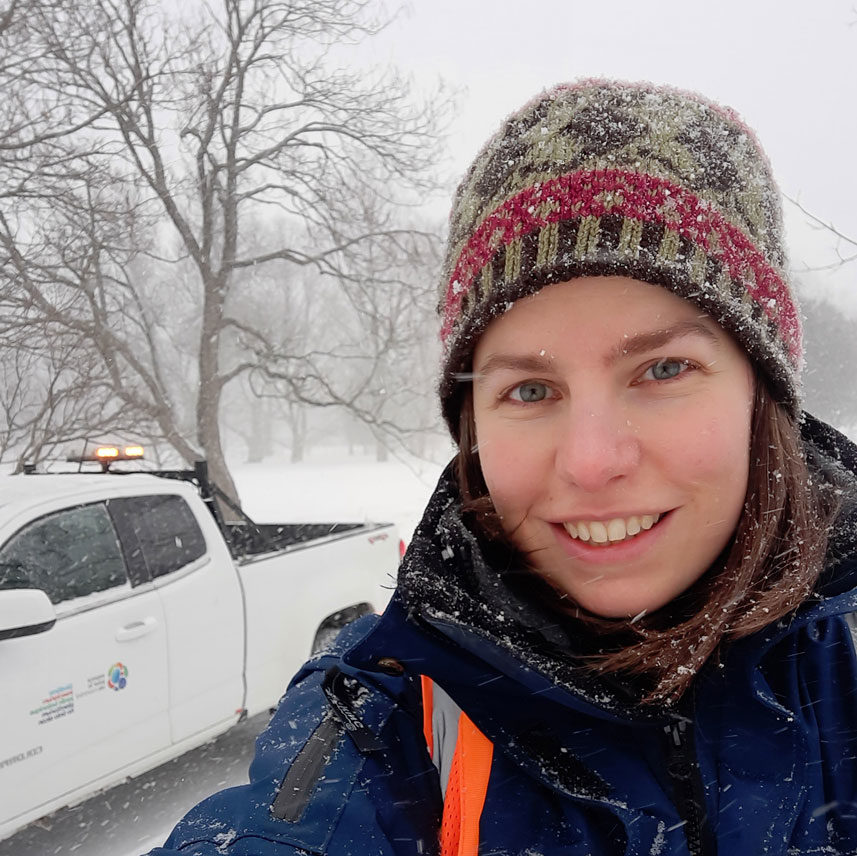
Meagan Hanna, MA
Living Collections Supervisor, Gardens and Arboriculture, Montreal Botanical Garden, City of Montreal
Sessional Lecturer, University of British Columbia
1. What are your proudest accomplishments?
I feel grateful to have been part of so many remarkable teams devoted to meaningful arboricultural endeavours. Working with passionate folks has inspired my commitment to the field.
Since 2013, I have had the honour to work closely with the crew at la Société internationale d’arboriculture Québec in different volunteer capacities. Together, we have offered French language resources and programming in arboriculture for tree care professionals.
I am proud to be a part of the horticulture team at the Montreal Botanical Garden. As living collections supervisor, I get to support an engaged team of specialists nurturing exceptional plants and gardens. Our city, botanical garden and horticulture division are all led by driven and collaborative women. Our garden team is focused on the future, motivated to care for our spaces and our living collections in sustainable ways.
Teaching arboriculture for the University of British Columbia’s Master of Urban Forestry Leadership program has also been a gratifying experience. Connecting with the program’s first cohort of students has made me hopeful for the next generation of leaders, eager to improve the health, quality and accessibility of urban green spaces.
I consider myself privileged to have built a career in a field where learning and collaboration are integral components of the job.
2. How has the urban forestry field changed since you first entered the profession and what are the biggest opportunities ahead for women in your field?
It’s encouraging to see more educational opportunities in urban forestry. I hope that this expands into more certificate and diploma programs. I discovered the field about a decade ago while I was working in public horticulture. At the time, it was difficult to find focused, professional training in this domain. Thankfully, things are getting better but there is room for improvement.
I noticed an important shift over the last 15 years: more women creating supportive professional networks. Some really influential groups have been formed from the initiative and energy of one or a few women. Over time, these communities have flourished to engage women, and folks along the entire spectrum of gender, from all over the world. I am particularly grateful for Women’s Tree Climbing Workshop, Women in Arboriculture Virtual Chat and Women in Arboriculture Ontario as these communities have supported me on my personal journey.
I think one of the biggest opportunities for women in urban forestry in Canada is happening in municipalities right now. Lots of professionals are approaching retirement, leaving vacancies in key positions. This is a great time to explore urban forestry. Governments appear to be recognizing a greater importance of trees and green spaces. As communities also recognize that perpetual investment and care are part of sustainable urban forests, I anticipate that the need for qualified professionals will grow. Many teams out there need collaborative, inclusive and visionary leaders. If someone is passionate about trees, working with people and bringing constructive change to their community, a challenging and rewarding career in urban forestry leadership may be the opportunity for them!
3. What is one piece of advice you have for young girls and women that want to get into the urban forestry field?
I encourage young girls and women to really take stock of their interests and subjects they’re passionate about. Then, go out there and discover!
If I had a second chance at an aspect of my life, I would have given volunteering a shot ten years earlier. Some of the most fun I have ever had has been with other volunteers. Volunteering enabled me to commit time to different causes and explore different tasks. Over time, I’ve aligned my skills and interests with a purpose that is meaningful to me.
For folks interested in urban forestry, I would definitely suggest starting with your local chapter of the International Society of Arboriculture (ISA) and attending an online workshop or conference if you can. Many of these organizations have discounts for students too. I would also recommend reaching out to a Women in Arboriculture group as these communities are accepting and safe places to engage with other women who are enthusiastic about trees.
Stay open to different topics and points of view, do your best and be kind (to others but to yourself too, please). With a similar approach and a little courage to get out there, you’d be surprised where you might wind up!
← Back to the International Women’s Day 2022 post
Back to all articles